|
|
 Kaypro (Non Linear Systems - Portable Computers) Kaypro (Non Linear Systems - Portable Computers)
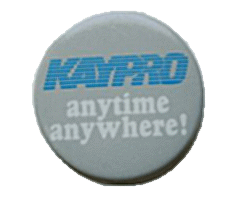 (official sticker) (official sticker)
Andy Kay's dream
 (sadly he passed away on 5th Sep. 2014) (sadly he passed away on 5th Sep. 2014)
In 1981 Andrew Kay had the idea to build personal computers, and he realized that dream in 1982 with the Kaypro II, which was a great step forward compared to his rival Osborne-1.
The Kaypro II owns a 9" green monitor which was capable to show 80 chars a line - ideal for word processing (at this time).
Also, it was the first CP/M computer with a comprehensive software paket (from Perfect Software).
Here are the technical specs from the first Kaypro:
Z80 CPU 2.5 MHz, two SS/DD 5.25" floppy drives with approx. 190 KB capacity, one serial (RS-232) and one parallel (IEEE) port, the 9" monitor and and a good keyboard, all-in-one metal (!) case:
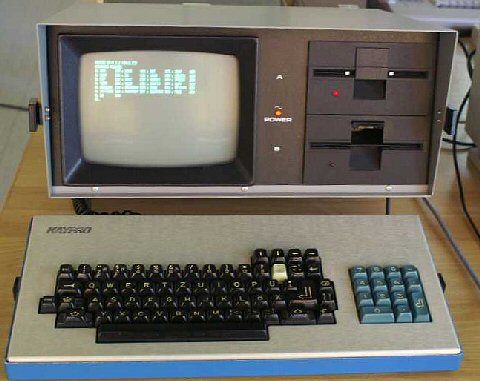
One of the strange behaviours are shown here also:
One of the disk drive is always selected (even nothing is done), this was changed with several third party firmware ROMs, like the famous Advent TurboROM or the better, but less known KayPlus ROM.
The KayPlus ROM is still downloadable at the above URL/page !
I haven't found Plu*Perfect Systems in the internet anymore, so I offer a download for this 8 KB Advent TurboROM (Version 3.4) here, for the utilities and docs see here or documentation in readable 'PC' text here. I will remove this link asap if the original copyright holder inform me that this offer is not desired.
Btw. I offer here a german CP/M 2.2 bootdisk for the Kaypro II also here, other can be found here or look for system / install disks here).
Two mainboard versions were shipped with the Kaypro II's, one without, and one with the ability of controlling double sided floppy drives.
There was also a Kaypro IV (aka Kaypro 4'83) and a Kaypro 4'84, which can be distinguished by comparing the floppy drive height (IV was equipped with full height drives, 4 with half height ones).
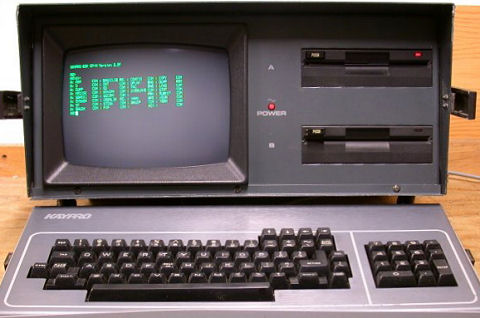
Above, a Kaypro 4 is shown (with a 4 MHz Z80).
Btw. again... I looked for a CP/M 2.2 bootdisk for the Kaypro IV with german keyboard support for years, but I found one meanwhile - can be d/l'd here, other can be d/l'd here or look for system / install disks here).
Below, a later Kaypro 2 is shown (also with a 4 MHz Z80):
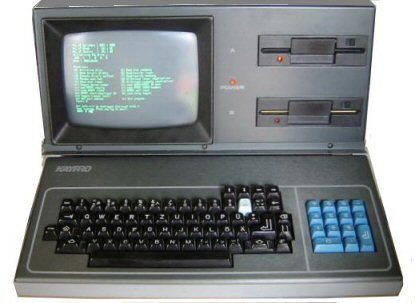
A version with a 10 MByte harddisk, the Kaypro 10, was introduced in 1984. The HD was driven with a WD1002 controller chip:

The last CP/M capable version was the Kaypro 1 (which was similar to the Kaypro 2X, with vertical installed drives):
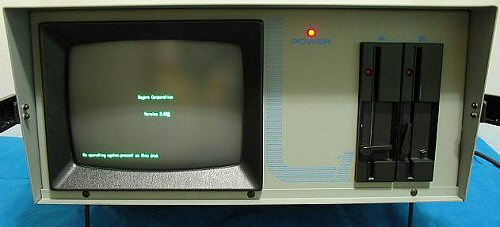
This last one, the Kaypro 16 was a PC compatible computer with the "old" metal case of the CP/M Kaypro's, not capable of running CP/M:
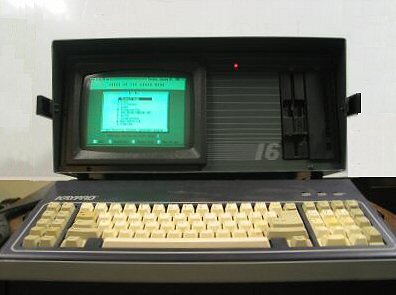
See here for a complete model history:
| Model |
Z80 CPU |
Mainboard |
Diskstorage |
| Kaypro II |
2.5 MHz |
81-110-n or 81-240-n |
two single sided 191k floppy drives |
| Kaypro 2'84 or 2X |
4.0 MHz |
81-294-n |
two double sided 390k floppy drives |
| Kaypro 4 |
2.5 MHz |
81-240-n |
two double sided 390k floppy drives |
| Kaypro 4'84 |
4.0 MHz |
81-184-n |
two double sided 390k floppy drives |
| Kaypro 4X |
4.0 MHz |
81-296-n |
two double sided hd 2.6m floppy drives |
| Kaypro 10 |
4.0 MHz |
81-180-n |
one double sided 390k floppy drive, one hard disk drive 10m |
| Kaypro Robie |
4.0 MHz |
81-296-n |
two double sided hd 2.6m floppy drives |
|
|
|
|
| Model |
CP/M version |
ROM |
|
| 2/83 |
2.2F |
81-149-C or 81-232-A |
|
| 4/83 |
2.2F |
81-232-A |
|
| 4/83 + 88 |
2.2F |
81-232-A |
|
| 2/84 |
2.2G |
81-292-A |
|
| 4/84 |
2.2G |
81-292-A |
|
| 4/84 + 88 |
2.2G |
81-292-A |
|
| 2X |
2.2G |
81-292-A |
|
| 4X |
2.2G |
81-326-E |
|
| Robie |
2.2G |
81-326-E |
|
There was also a ROM named 'Universal ROM', which replaces all other versions later.
There were also Kaypros relabeled as "Omni II Logic Analyzer" with an additional logic analyzer board and interface.
The Kaypro's with +88 have an optional board with an Intel 8088 CPU and 256 KB RAM, so it was possible to run MS-DOS also.
Schematics (Logic) for the Kaypro II (not Kaypro 2): here
Schematics (Logic) for the Kaypro 2 (not Kaypro II): here
One of the most famous Kaypro user was Arthur C. Clarke :
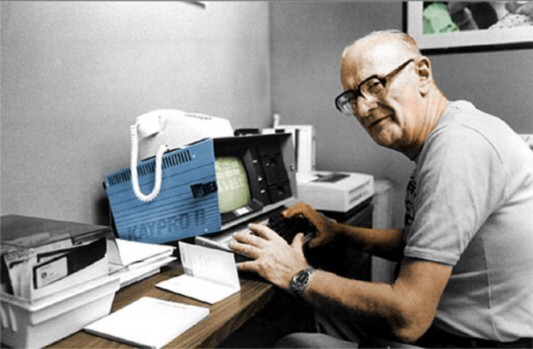
He wrote his science fiction novel "2010" with the help of a Kaypro II (he lived also in Sri Lanka, and used a modem for transferring documents, some details can be read >here< about it).
|





















 Kaypro (Non Linear Systems - Portable Computers)
Kaypro (Non Linear Systems - Portable Computers) (official sticker)
(official sticker) (sadly he passed away on 5th Sep. 2014)
(sadly he passed away on 5th Sep. 2014)





